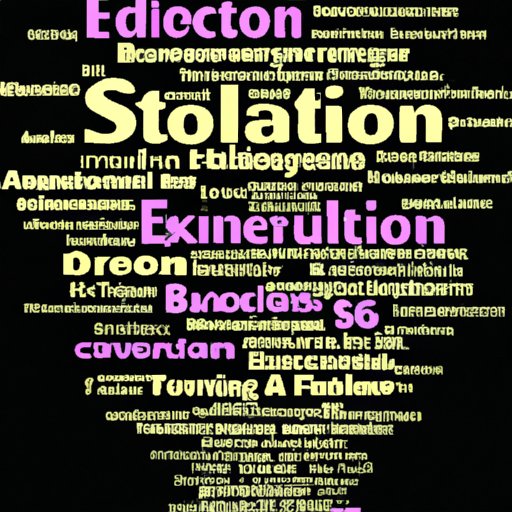Introduction
Science fiction is one of the most popular genres in both literature and film. But what is science fiction? How has it evolved over time, and what is its impact on society? This article will explore these questions and more, examining the history of science fiction and its influence on modern culture.

Exploring the Definition of Science Fiction
Science fiction is a genre of speculative fiction that typically deals with imaginative and futuristic concepts such as advanced science and technology, space exploration, time travel, parallel universes, and extraterrestrial life. It can also be used to explore social and political issues in a speculative way, often using metaphors to make commentary on current events.
Common elements of science fiction include futuristic settings, technology or scientific developments, and explorations of the unknown. As author Ursula K. Le Guin said, “Science fiction is not prescriptive; it is descriptive.” In other words, science fiction looks at what could be, rather than what should be.
A History of Science Fiction in Literature, Film and Television
Science fiction has been around for centuries, but it wasn’t until the 19th century that the term was coined. The first use of the phrase “science fiction” appeared in 1851 in William Wilson’s novel A Little Earnest Book upon a Great Old Subject. Since then, the genre has exploded in popularity, with many authors, filmmakers, and television creators exploring the possibilities of science fiction.
Early examples of science fiction in literature include Mary Shelley’s Frankenstein (1818), Jules Verne’s Journey to the Center of the Earth (1864), and H.G. Wells’ War of the Worlds (1898). These books explored the idea of technology gone awry, and the consequences of unchecked scientific advancement.
In the early 20th century, science fiction began to appear in film, with films like Georges Méliès’ A Trip to the Moon (1902) and Fritz Lang’s Metropolis (1927). By the 1950s, science fiction had become a popular genre, with films such as The Day the Earth Stood Still (1951) and The War of the Worlds (1953). Television followed suit, with shows like The Twilight Zone (1959-1964) and Star Trek (1966-1969) paving the way for future series.

Examining Science Fiction Tropes and Themes
Tropes and themes are recurring elements in science fiction stories. Common tropes include alternate histories, time travel, alien invasions, and dystopias. Popular themes include the exploration of what it means to be human, the consequences of technological advancement, and the implications of space exploration.
These tropes and themes evolve over time, as different media explore the possibilities of science fiction. For example, while dystopian stories have been around since the 19th century, they have become increasingly popular in recent years, with films like The Hunger Games (2012) and books like The Handmaid’s Tale (1985) exploring the darker side of humanity.

Exploring the Impact of Science Fiction on Society
Science fiction has had a profound impact on society. It has been used as a tool for social commentary, exploring the potential dangers of unchecked technological advancement and the implications of various political systems. As author Kurt Vonnegut said, “Science fiction is any idea that occurs in the head and doesn’t exist yet, but soon will, and will change everything for everybody, and nothing will ever be the same again. As soon as you have an idea that changes some small part of the world you are writing science fiction. It is always the art of the possible, never the impossible.”
Science fiction has also had an influence on technology. Many of the technologies we take for granted, such as cell phones, were predicted by science fiction authors decades before they became reality. Science fiction has encouraged scientists and engineers to push the boundaries of what is possible, leading to the development of new and innovative technologies.
Analyzing the Genre of Science Fiction
What makes science fiction unique? While other genres, such as fantasy and horror, also explore the unknown, science fiction does so through the lens of science and technology. It is a genre of exploration and discovery, of pushing the boundaries of what is possible. As author Ray Bradbury said, “Science fiction is any idea that crosses the horizon of the possible.”
Science fiction also appeals to readers because of its ability to explore complex social and political issues in a unique way. Through its use of metaphor and allegory, science fiction allows readers to see the world in a new light and consider alternative solutions to real-world problems.
Exploring Science Fiction Subgenres
Science fiction can be divided into various subgenres, each with its own distinct style and approach. Cyberpunk, for example, focuses on high-tech, low-life societies in which technology has run rampant. Steampunk takes place in an alternate history in which steam power is still used for technology. Post-apocalyptic stories explore the aftermath of a global disaster, while space operas take place in outer space and involve intergalactic conflict.
Conclusion
Science fiction is a genre of exploration and discovery, of pushing the boundaries of the possible. It has been used as a tool for social commentary, exploring the potential dangers of unchecked technological advancement and the implications of various political systems. It has also had an influence on technology, inspiring scientists and engineers to develop new and innovative technologies.
Science fiction is a diverse genre, with many different subgenres and tropes. From cyberpunk to steampunk, post-apocalyptic to space opera, there is something for everyone. Whether you’re looking for a thrilling adventure or thought-provoking commentary, science fiction has it all.
(Note: Is this article not meeting your expectations? Do you have knowledge or insights to share? Unlock new opportunities and expand your reach by joining our authors team. Click Registration to join us and share your expertise with our readers.)
